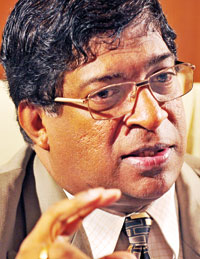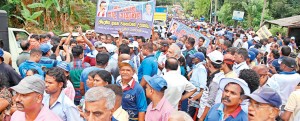Columns
VAT is the cause of their discontent
View(s): What on earth is going on in this miracle of Asia? From the day the Finance Minister and other UNP whiz-kids in the cabinet tried to increase the Value- Added Tax from 11 per cent to 15 per cent, the exercise seemed jinxed. Not too long ago Ravi Karunanayake tried to up the VAT by administrative fiat. That attempt came a cropper. The judiciary ruled that imposing new taxes or raising them cannot be done administratively. That was a matter for parliament and the legislature must approve any such changes. If not it was a violation of the country’s constitution.
What on earth is going on in this miracle of Asia? From the day the Finance Minister and other UNP whiz-kids in the cabinet tried to increase the Value- Added Tax from 11 per cent to 15 per cent, the exercise seemed jinxed. Not too long ago Ravi Karunanayake tried to up the VAT by administrative fiat. That attempt came a cropper. The judiciary ruled that imposing new taxes or raising them cannot be done administratively. That was a matter for parliament and the legislature must approve any such changes. If not it was a violation of the country’s constitution.

From the day Finance Minister Ravi Karunanayake and other UNP whiz-kids in the cabinet tried to increase the Value-Added Tax from 11 per cent to 15 per cent, the exercise seemed jinxed.
How the government panjandrums some of whom have spent years vegetating as elected representatives of the people, missed this basic legislative requirement adds a funny tale to the comic goings-on in what is called – at least by those who rule over an increasingly embittered populace- the government of good governance (GGG), if another coinage might be permitted to describe the Government of National Unity (GNU) or National Unity Government (NUG) among other abbreviations.
One would have expected this major mistake to be corrected and the VAT increase presented to parliament. Indeed it was done. A Bill was presented to parliament. So everything should have been smooth sailing down the Diyawanna Oya from then on and the VAT hike would become a fait accompli ending all the confusion and the unscrupulous exploitation of this confusion that preceded it.
Well that is what common sense would have expected the ‘brains trust’ in charge of economic affairs in the country to do. Instead of sailing peacefully down the nearby oya, this boatload of parliamentary brains runs into a storm with no one seemingly at the wheel.
Once more it is the Supreme Court that stirred up a storm declaring the most recent attempt to legitimize the VAT increase as a nullity since the proper procedures had not been followed in presenting the Bill to parliament.
There is no need to repeat the Supreme Court ruling as The Hon. Speaker Karu Jayasuriya has already done so in parliament and the public have probably read it in the media. It is hoped, of course, that at least hereafter the government’s worthies would read the rule books, if one might put it plainly, if they have not done so already, and follow the procedures.
But the VAT story has more sides to it than an octagon. VAT is the cause of discontent made gloriously farcical by bungling politicians if one might adapt the words of the Bard. Why so much effort is being put into raising the VAT limit and broadening the base of the Nation Building Tax (NBT) is clear enough. The government does not generate enough revenue to meet its expenses. So it is confronted with a fiscal deficit that has to be bridged, if possible, by increasing VAT and other taxes resulting in additional burdens on household budgets.
The easiest way of collecting more revenue is by way of VAT, so economists and others more learned in the subject tell us. Whether that is straight from the economic gospel or not, it is the poor consumer already saddled with increasing living costs who pays the price.
One reason why the Joint Opposition (JO) launched its “pada yaathra” which would have entailed a 72-mile walk if the police had not truncated it by a couple of miles through a court order prohibiting the walk from starting from the Kandy municipal limits, was because of the growing public dissatisfaction over the increased VAT, the resultant confusion and who should be paying it.
Never mind whether the final rally in Colombo attracted a mere 20,000 people as the SLFP general secretary Duminda Dissanayake said on television or a couple millions as told to the public by Geetha Kumarasinghe or any other astronomical figure trotted out by pada yaathrayas, if one might call them that, to boost its importance and their egos.
Viewed from here it would seem that the pada yaathra (though some preferred the comfort of their duty-free vehicles) was able to muster support from some sections of the public not necessarily supportive of or even sympathetic to, what critics call a publicity stunt, is because of uncertainty and the tug-of-war over economic policy and implementation that leaves the public and the private sector wondering about the future.

One reason why the Joint Opposition (JO) launched its “pada yaathra” was because of the growing public dissatisfaction over the increased VAT.
It might be recalled that the 2016 budget, the very first by the National Unity Government was chopped and changed after the cabinet had approved it before being presented to parliament. President Sirisena thought some of the proposals were unacceptable because it imposed more burdens on the people.
Why the differences were not settled before the budget was presented remains a mystery. But what it did show was that if cohabitation between the SLFP and the UNP was beginning to appear so early in this marriage of convenience then life will prove to be more fractious later.
This is precisely what it is turning out to be. More recently, Prime Minister Ranil Wickremesinghe’s nominee as Governor of the Central Bank Arjuna Mahendran found that his post was not extended by President Sirisena who found opposition to Mahendran’s continued presence amid allegations of bond scam, coming from within his own party.
If one might adapt the saying in the book “Imitation of Christ”, Wickremesinghe proposes, Sirisena disposes. Yet given Sri Lanka’s penchant for revolving-door politics Mahendran re-enters as an adviser in the Prime Minister’s office and so ‘imposed’ on the public which has to pay for his upkeep.
While other differences in policy between the two principal parties in the coalition are evident, what is galling is that this cash-strapped government ready to inflict tax hikes on an already exasperated people, seems to think nothing of its own financial profligacy.
It would be readily admitted that the Mahinda Rajapaksa government was extremely liberal with state funds. The abuse and misuse of state resources and the money wasted on and by state institutions such as SriLankan Airlines and Mihin Lanka is just one example of the wastefulness practiced by those responsible for administering these institutions.
Those round Rajapaksa had no qualms about drawing on state funds for activities that brought no benefit to the country.
The yahapalanaya government came to power promising to eliminate such waste in public resources and be open and accountable in what it would do. The public believed such pledges would be carried out and voted for it.
One of the first acts of this government was to implement a salary increase for public servants. I dare say those on fixed wages such as public servants do deserve to be better looked after. But if a country is faced with declining revenues and its public debt is turning out to be unbearable then one would expect a prudent government to manage spending within its means.
The annual cost to the exchequer of the salary increase would be US$ 1 billion or more annually, according to one who had done his arithmetic. Let us say that the salary increase is justified, though we know that there are officials who make money on the side by means fair or foul- mostly foul as the public is well aware.
But what is the justification for doling out duty-free vehicle permits to parliamentarians especially when the leaders of this government are aware that it is facing a severe fiscal deficit?
Not only are they being provided with another round of duty-free vehicle permits but the value of the vehicles they could import have also been increased. Senior public servants are also being provided with a duty free facility. Now doctors employed by the state are demanding new vehicles every five years. Some of them hardly travel except perhaps to private hospitals and nursing homes where they stuff their pockets with unconscionable fees extracted from desperate patients. Now they are trying to hold the government to ransom but actually hurting the public.
Knowing only too well that the state was facing a financial crisis blaming the previous government for much of it, did this administration not put out a feeler to increase hugely the daily payment to MPs for attending parliament or some similar proposal?
It is incredible that any thoughtful person could propose such an insane idea unless it was a political move to win over the support of MPs from either side of the chamber. Why should MPs be paid an additional allowance for attending parliament when the purpose of their being elected is to attend parliament?
Look at the rents being paid to private individuals for leasing out property to house ministries and government offices. The most glaring case is that of the Ministry of Agriculture which has leased a building for five years at a cost running into billions of rupees. Two years rent in advance has been paid but the building remains unoccupied since April, some reports says, adding that the monthly rental is Rs 21 million.
Moreover a recent news report said that Agriculture Minister and secretary of the SLFP had submitted a cabinet proposal seeking Rs.403 million to renovate and refurbish the new premises for his ministry.
MP Dissanayake also revealed that the monthly cost to maintain a minister- and deputy and state ministers – is Rs 50 million.
If these reports are true – and I have not seen any contradiction of them – this government does not seem to face any revenue deficit judging by the lavish spending spree. So why do we need this increase in VAT and the broadening of the NBT base?
The problem is that the government has run to the IMF for an Extended Fund Facility and this international lending institution has granted US$ 1.5 billion. But it demands its pound of flesh. One of the key conditions it imposed on Sri Lanka is that it increases its revenue collection in order to meet its debt-servicing and expenditure needs. That is why the UNP is pushing ahead with the 4 per cent increase in VAT despite the protests from multiple quarters.
Speaking at a provincial meeting some months back President Sirisena said that he will not allow officials to burden people with more taxes and he will send home any economists who advance such unacceptable proposals.
Economists at home might duck for cover before they feel the stingray on their backs – metaphorically speaking – as President Sirisena once promised to do to some organizers of a concert which he thought undermined our ancient culture.
But there is little he could do to economists in the IMF. He does not pay their salaries but he and his UNP colleagues sure need their funds. That is also why our leaders are running back to China having, soon after the defeat of Rajapaksa, virtually turned their backs on Beijing and embraced the West.


Leave a Reply
Post Comment